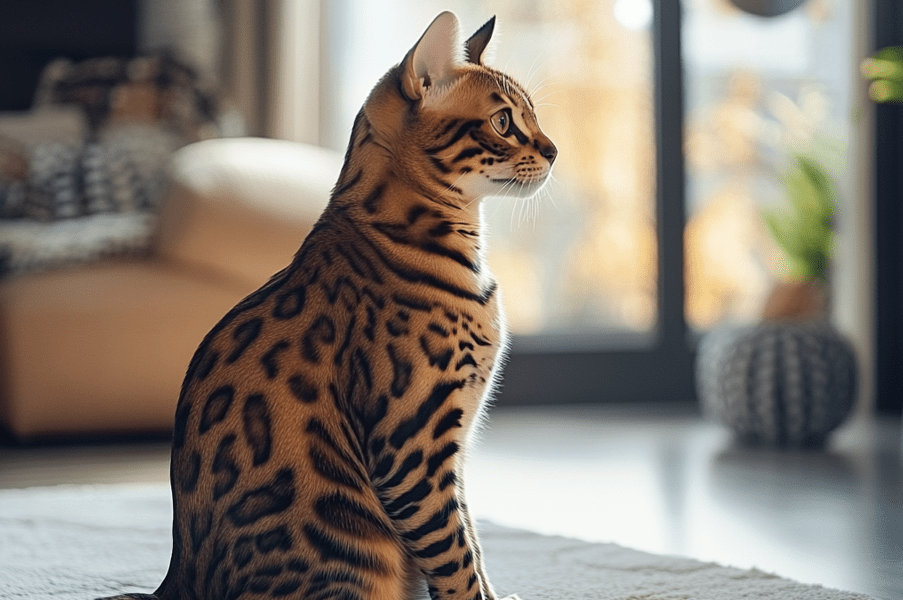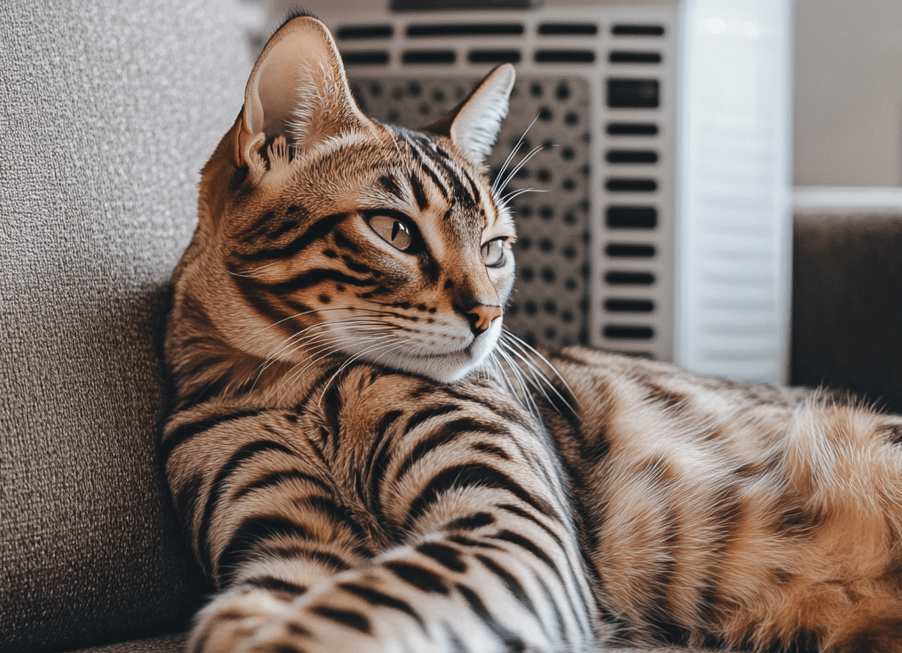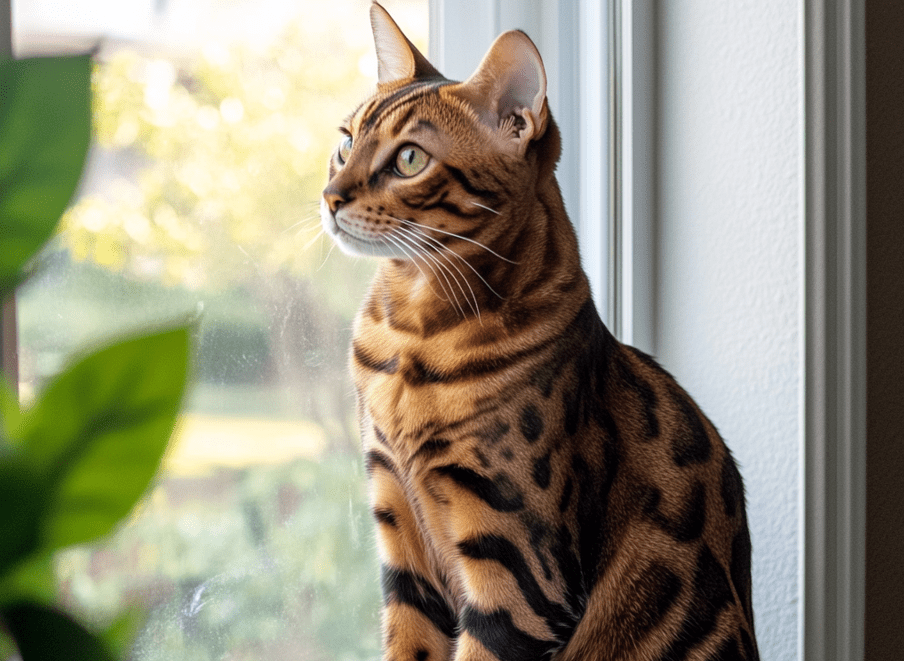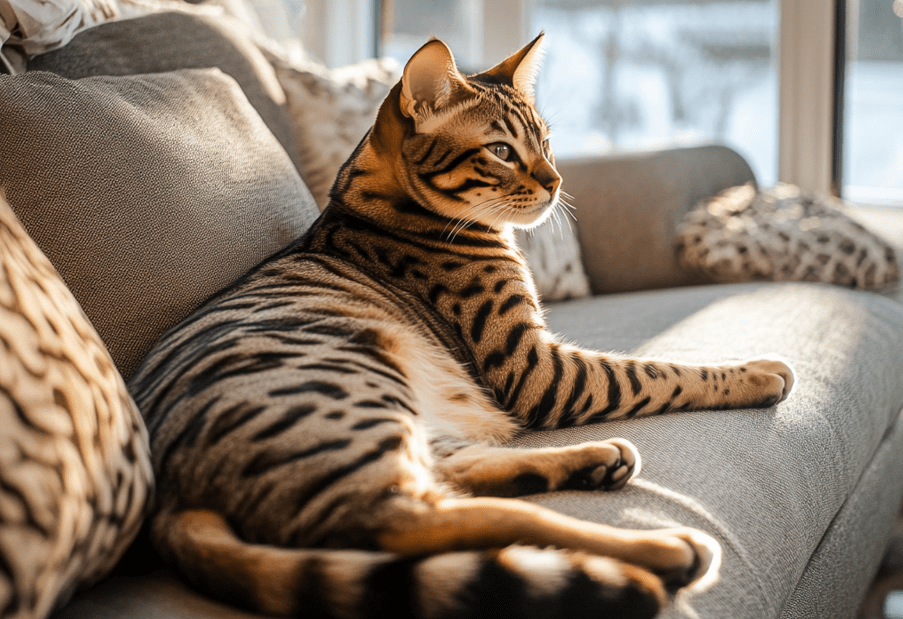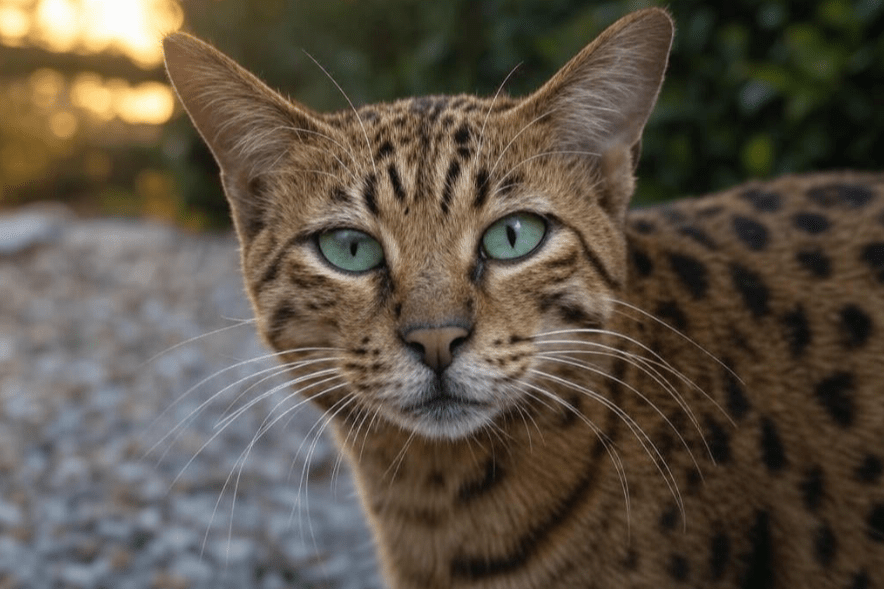
If you’re asking, “Why is my Bengal cat losing weight?”, you’re not alone. Bengal cats, with their striking spotted coats and athletic builds, are beloved for their wild appearance and playful energy. However, noticing your Bengal cat dropping pounds unexpectedly can be alarming. Weight loss in Bengals may stem from harmless causes like dietary changes or serious issues like underlying health conditions. This comprehensive guide dives deep into the reasons behind weight loss in Bengal cats, when to seek veterinary care, and how to ensure your feline friend stays healthy and vibrant.
What Does Weight Loss Look Like in Bengal Cats?
Bengal cats are naturally lean and muscular, so even slight weight changes can be noticeable. Unintentional weight loss—when your cat sheds pounds without a change in diet or exercise—often signals a problem. For Bengals, whose high metabolism fuels their active lifestyle, maintaining a stable weight is crucial. Weight loss may appear as:
1.A more pronounced spine or ribs.
2.A tucked-in abdomen or reduced muscle mass.
3.A dull coat or decreased energy levels.
Why Bengals Are Prone to Weight Fluctuations
Bengals have unique needs due to their high energy and ancestry tied to the Asian leopard cat. Their fast metabolism and love for play require a nutrient-dense diet. Any disruption in their routine, health, or environment can lead to noticeable weight changes, making it essential to monitor their condition closely.
Common Reasons Why Your Bengal Cat Is Losing Weight
Understanding the root cause of your Bengal’s weight loss is the first step to addressing it. Below are the most common reasons, ranging from medical conditions to lifestyle factors, along with actionable advice.
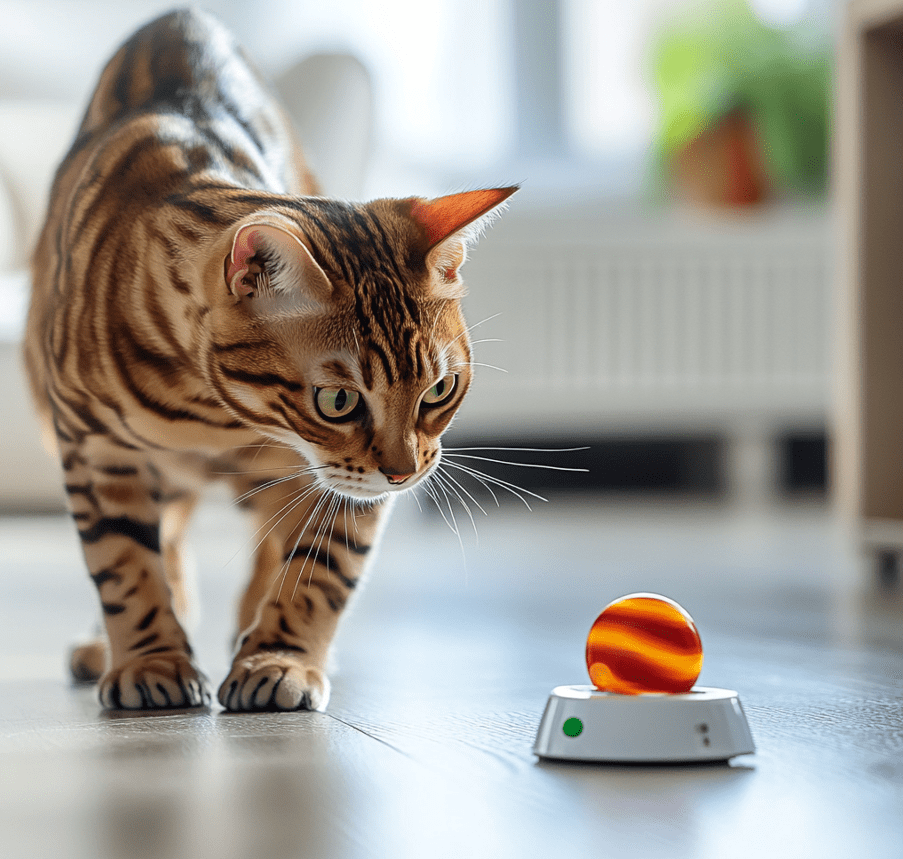
1. Inadequate Diet or Feeding Issues
As obligate carnivores, Bengals thrive on high-protein, meat-based diets. If your cat isn’t getting enough calories or nutrients, weight loss can occur. Common dietary problems include:
Picky Eating: Bengals can be finicky, refusing food that doesn’t suit their taste.
Low-Quality Food: Diets with fillers like corn or soy may not meet a Bengal’s nutritional needs.
Feeding Competition: In multi-cat households, other pets may eat your Bengal’s food.
What to Do: Choose a high-quality, protein-rich cat food (wet or raw diets are often ideal for Bengals). Feed measured portions in a quiet space to avoid competition. If your Bengal is picky, experiment with different textures or flavors under vet guidance.
2. Dental Health Problems
Dental issues, such as gingivitis, tooth decay, or abscesses, can make eating painful, causing your Bengal to eat less and lose weight. Dental disease is common in cats, especially as they age.
Signs to Watch For:
1.Bad breath or drooling.
2.Difficulty chewing or dropping food.
3.Red, swollen gums.
What to Do: Schedule a dental exam with your vet. Regular teeth brushing with pet-safe toothpaste and dental treats can prevent issues. Severe cases may require professional cleaning or tooth extraction.
3. Parasitic Infections
Intestinal parasites like roundworms, tapeworms, or giardia can rob your Bengal of nutrients, leading to weight loss. Outdoor Bengals or those on raw diets are at higher risk.
Signs to Watch For:
1.Diarrhea or vomiting.
2.Visible worms in stool.
3.A potbellied appearance.
What to Do: Request a fecal test from your vet to detect parasites. Follow their recommendations for deworming and maintain a regular parasite prevention schedule.
4. Hyperthyroidism
Hyperthyroidism, common in cats over 7 years old, occurs when the thyroid gland produces excess hormones, speeding up metabolism. This can cause weight loss despite an increased appetite.
Signs to Watch For:
1.Ravenous hunger.
2.Increased thirst and urination.
3.Restlessness or a scruffy coat.
What to Do: A blood test can confirm hyperthyroidism. Treatment options include medication, radioactive iodine therapy, or surgery. Early diagnosis improves outcomes.
5. Feline Diabetes
Diabetes affects how your Bengal’s body processes glucose, leading to weight loss even if they’re eating normally. It’s more common in overweight or older cats but can affect any Bengal.
Signs to Watch For:
1.Excessive thirst and urination.
2.Lethargy or weakness.
3.Sweet-smelling breath.
What to Do: Blood and urine tests diagnose diabetes. Your vet may prescribe insulin injections, a special diet, and regular monitoring to manage the condition.
6. Gastrointestinal Disorders
Conditions like inflammatory bowel disease (IBD), pancreatitis, or food allergies can disrupt nutrient absorption, causing weight loss. Bengals with sensitive stomachs may be more susceptible.
Signs to Watch For:
1.Chronic vomiting or diarrhea.
2.Reduced appetite.
3.Abdominal discomfort.
What to Do: Your vet may recommend diagnostic tests like bloodwork or ultrasounds. A hypoallergenic or prescription diet can help manage GI issues.
7. Cancer
Cancer, such as lymphoma or intestinal tumors, is a serious but possible cause of weight loss in Bengals. It’s more common in older cats but can occur at any age.
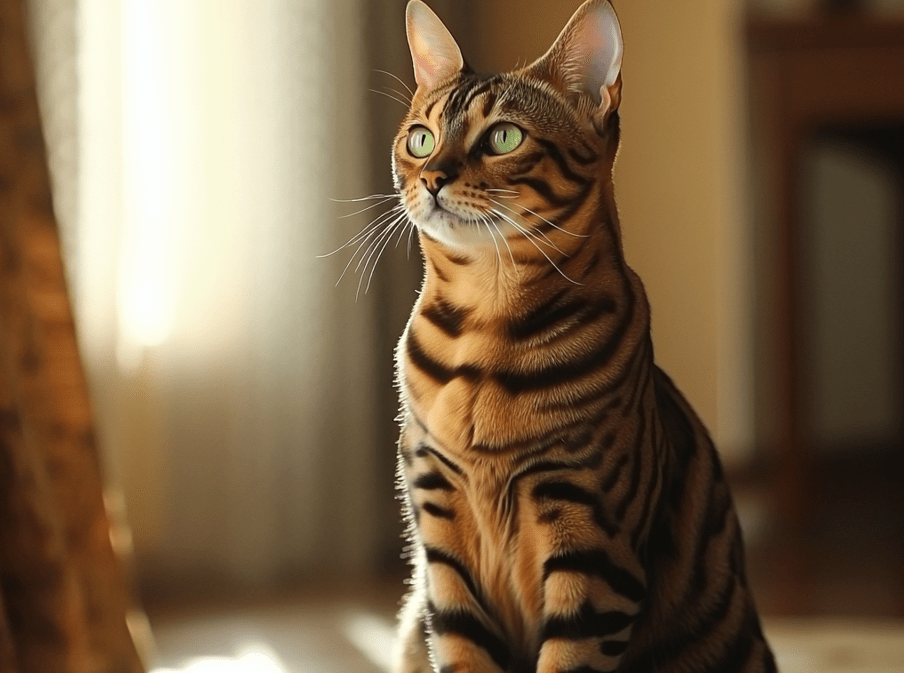
Signs to Watch For:
1.Unexplained lumps or swelling.
2.Lethargy or loss of appetite.
3.Abnormal bleeding or discharge.
What to Do: Early detection is critical. If you notice unusual symptoms, request a vet exam with imaging or biopsies to rule out cancer.
8. Stress or Anxiety
Bengals are highly intelligent and sensitive, making them prone to stress from changes like moving, new pets, or loud environments. Stress can reduce appetite, leading to weight loss.
Signs to Watch For:
1.Hiding or aggression.
2.Overgrooming or hair loss.
What to Do: Provide a stable, enriched environment with toys, climbing trees, and quiet spaces. Pheromone diffusers or vet-prescribed anti-anxiety treatments can help.
9. Chronic Kidney Disease (CKD)
CKD is prevalent in older Bengals and can cause weight loss due to reduced appetite and nutrient loss through urine.
Signs to Watch For:
1.Increased thirst and urination.
2.Vomiting or lethargy.
3.Poor coat condition.
What to Do: Routine bloodwork detects kidney issues early. A kidney-friendly diet, fluid therapy, and medications can manage CKD symptoms.
10. Infections or Viral Diseases
Feline immunodeficiency virus (FIV), feline leukemia virus (FeLV), or bacterial infections can weaken your Bengal, leading to weight loss.
Signs to Watch For:
1.Recurrent infections.
2.Fever or lethargy.
3.Poor appetite.
What to Do: Keep vaccinations current and limit exposure to untested cats. Blood tests can diagnose viral infections, and antibiotics may treat bacterial issues.
When Should You Worry About Your Bengal’s Weight Loss?
While gradual weight loss in an overweight Bengal under a vet’s guidance is normal, unintentional weight loss is a red flag. Contact your vet if your Bengal:
1.Loses more than 10% of their body weight in 1–2 months.
2.Stops eating or has a drastically reduced appetite.
3.Shows symptoms like vomiting, diarrhea, or behavioral changes.
4.Has a dull coat, excessive thirst, or litter box issues.
Veterinary Diagnosis for Weight Loss
To pinpoint the cause, your vet may perform:
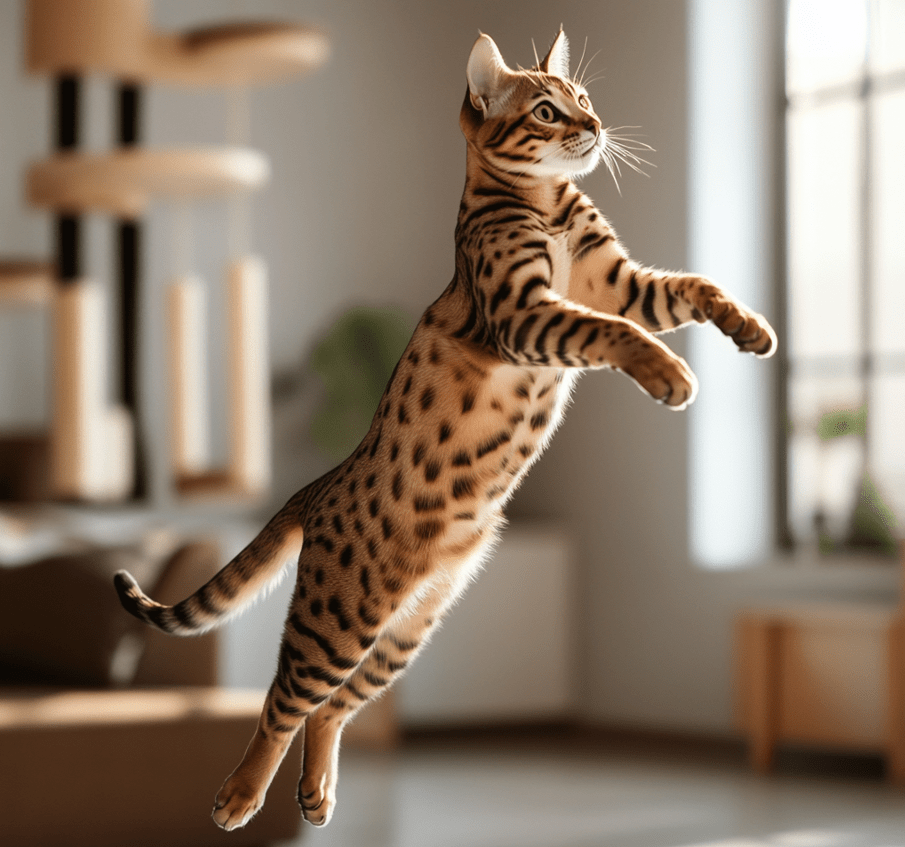
Physical Exam: Checking for lumps, dental issues, or dehydration.
Blood and Urine Tests: Assessing organ function, thyroid levels, and infection markers.
Fecal Analysis: Detecting parasites.
Imaging: X-rays or ultrasounds to identify tumors or organ abnormalities.
Biopsies: For suspected cancer or chronic conditions.
How to Prevent Weight Loss in Your Bengal Cat
Proactive care can help maintain your Bengal’s healthy weight. Here’s how:
1. Provide a Balanced, High-Quality Diet
Choose cat food with high animal protein and minimal fillers. Wet food supports hydration, which is vital for Bengals prone to urinary issues. Consult your vet for portion recommendations based on your cat’s age and activity level.
2. Monitor Eating Habits
Track daily food intake and weigh your Bengal monthly to catch changes early. Use a measuring cup for dry food and feed multiple cats separately to prevent stealing.
3. Schedule Regular Vet Visits
Annual checkups (or biannual for senior Bengals) with bloodwork and dental exams can detect issues before they cause weight loss.
4. Keep Your Bengal Active and Engaged
Bengals need mental and physical stimulation. Offer puzzle feeders, interactive toys, and climbing structures to reduce stress and promote appetite.
5. Minimize Stress
Introduce changes gradually and maintain a consistent routine. A calm environment supports your Bengal’s overall well-being.
Supporting a Bengal Cat Losing Weight
If your Bengal is diagnosed with a condition causing weight loss, follow your vet’s treatment plan. Additional tips include:
Boost Calorie Intake: Offer vet-approved high-calorie foods or supplements.
Make Food Appealing: Warm wet food or add low-sodium broth to entice eating.
Track Progress: Weigh your cat weekly and share updates with your vet.
Create a Comfortable Space: Ensure a quiet, stress-free area for eating and resting.
Conclusion

Asking “Why is my Bengal cat losing weight?” is a sign you’re a vigilant and caring pet owner. Weight loss in Bengals can result from dietary issues, stress, or serious conditions like hyperthyroidism, diabetes, or cancer. By staying attentive to your cat’s weight, appetite, and behavior, you can catch problems early. A high-quality diet, regular vet care, and a stimulating environment are key to keeping your Bengal healthy. If you notice unexplained weight loss or concerning symptoms, don’t wait—consult your veterinarian for a thorough evaluation. With proper care, your Bengal can live a long, active, and joyful life.
This guide is designed to be the ultimate resource for Bengal cat owners, offering clear, actionable advice to address weight loss and promote lifelong health.

